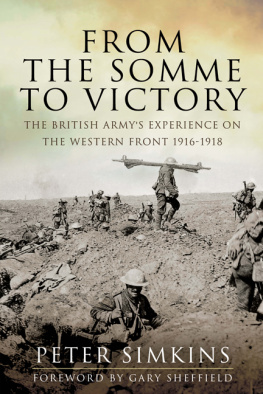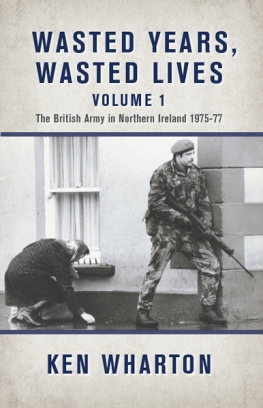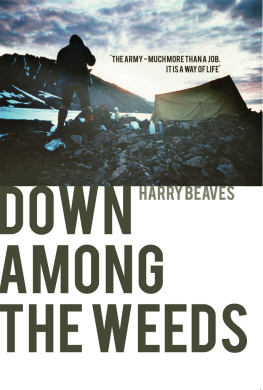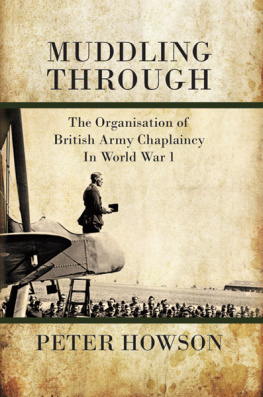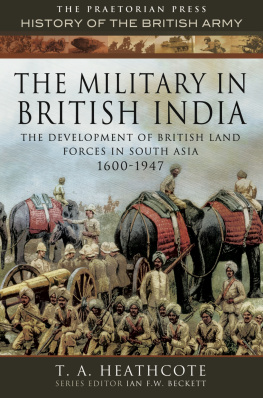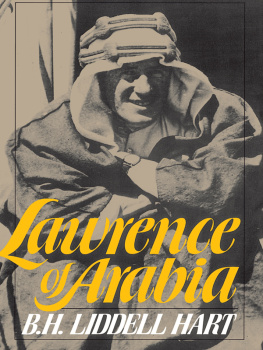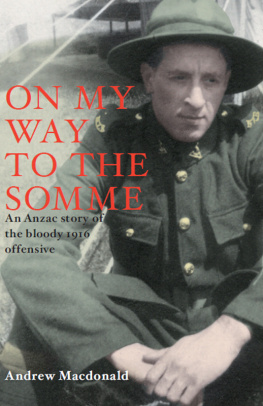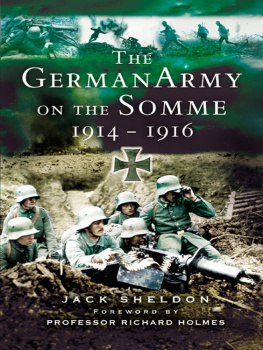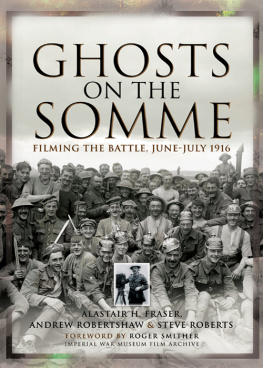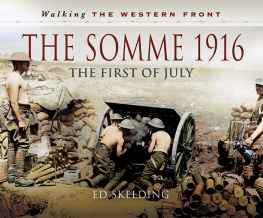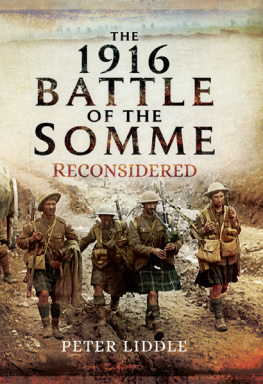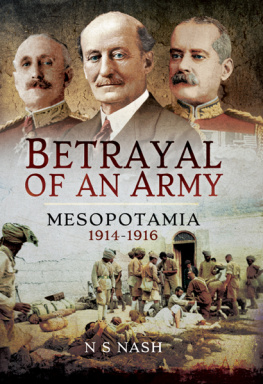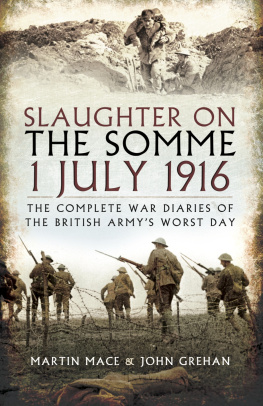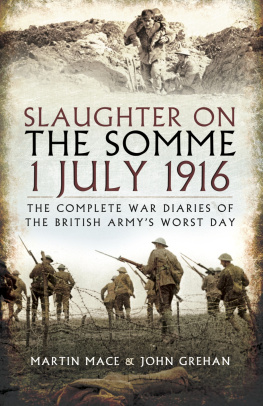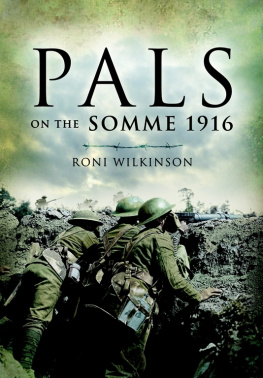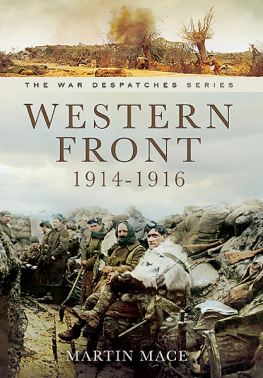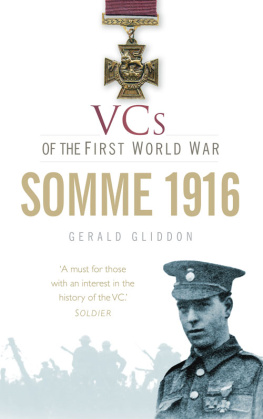
First published in Great Britain in 2014 by
The Praetorian Press
an imprint of
Pen & Sword Books Ltd
47 Church Street
Barnsley
South Yorkshire
S70 2AS
Copyright Peter Simkins 2014
ISBN 978 1 78159 312 7
eISBN 9781473841048
The right of Peter Simkins to be identified as the Author of this Work has been asserted by him in accordance with the Copyright, Designs and Patents Act 1988.
A CIP catalogue record for this book is available from the British Library
All rights reserved. No part of this book may be reproduced or transmitted in any form or by any means, electronic or mechanical including photocopying, recording or by any information storage and retrieval system, without permission from the Publisher in writing.
Typeset in Ehrhardt by
Mac Style Ltd, Bridlington, East Yorkshire
Printed and bound in the UK by CPI Group (UK) Ltd, Croydon, CRO 4YY
Pen & Sword Books Ltd incorporates the imprints of Pen & Sword
Archaeology, Atlas, Aviation, Battleground, Discovery, Family History,
History, Maritime, Military, Naval, Politics, Railways, Select, Transport,
True Crime, and Fiction, Frontline Books, Leo Cooper, Praetorian Press,
Seaforth Publishing and Wharncliffe.
For a complete list of Pen & Sword titles please contact
PEN & SWORD BOOKS LIMITED
47 Church Street, Barnsley, South Yorkshire, S70 2AS, England
E-mail: enquiries@pen-and-sword.co.uk
Website: www.pen-and-sword.co.uk
Contents
Foreword
P rofessor Peter Simkins MBE is one of the most significant historians of the First World War that Britain has produced. His reputation rests on his achievements not in one or two fields, but in many. As an author, lecturer, museum curator, battlefield tour guide, teacher, mentor and leading figure in the Western Front Association he has had, and continues to have, a central role in the world-wide community of scholars investigating the British army of 19141918. In this book he correctly observes that over the last fifty or so years, military history has become increasingly academically respectable, and that the study of British military history of the First World War has been transformed. In my view, Peter has played a quietly important role in both these processes, through his impeccable scholarship and his role as a public historian.
Undoubtedly, Peters magnum opus is Kitcheners Army . First published in 1988 and since republished, this is a magisterial study of the creation and organisation of the New Army and Territorial units and formations at the beginning of the First World War. Rereading the book over quarter of a century since its first appearance, several things strike me. First is the breadth of the coverage. This is not just military history, but also political, social and economic history of a very high order. The second is Peters mastery of such a vast range of primary and secondary sources. Third, Kitcheners Army has stood the test of time remarkably well. If a second edition ever came out, a great deal of scholarship that has appeared after its initial publication would need to be incorporated (much of it influenced by Peters work), but this would certainly not invalidate the conclusions of the original book. I am wary of using the word definitive, but I can safely say that it will be a very long time indeed before Kitcheners Army is supplanted as the essential book on the raising of the New Armies. Finally, it is worth reflecting on the extent to which Kitcheners Army has acted as a foundation upon which many other books, articles and dissertations have been built. To have written such a seminal work is a very fine achievement.
Following the writing of Kitcheners Army , Peter Simkins main scholarly focus has been on the operational history of the British Expeditionary Force (BEF) a natural progression from the raising of the New Armies to their employment on the battlefield. The chapters in this book give ample testimony to his impressive command of both primary sources and the secondary literature. He has produced a number of scholarly articles and book chapters, some of which appear in this book, but I would also mention three important pieces on the command of the BEF which readers of this volume should seek out. The first is Haig and the Army Commanders, published in 1999. The third piece is a discussion of Herbert Plumer, who was commander of Second Army for much of the war. The absence of personal papers makes Plumer a particularly tricky subject, but Peter made highly effective use of a range of primary sources to produce a masterly, must-read study.
Peter Simkins has had two careers, as a museum professional and as an academic military historian. His work at the Imperial War Museum, where he rose to become Senior Historian, was important not least for his role in presenting the history of Britain in the two world wars to the public. This was a busy and demanding job, and after retiring from the IWM he has been able to devote more time to research and writing on the Great War. Peter has also, to the great benefit of the subject, became one of the UKs foremost public historians of the First World War. In particular, he is a favourite on the Western Front Association lecture circuit.
Not every great scholar also has communication skills, but Peter is a wonderfully engaging and inspiring teacher. I had the privilege of working with him at the University of Birmingham and latterly at the University of Wolverhampton, and have sat on panels with him at many conferences and seminars, and shared guiding duties with him on a number of battlefield tours. Sparing his blushes, wherever he speaks he adds to his fan club, and he has been hugely influential in the community of First World War scholarship that has grown up in the UK over the last few years. He succeeded Correlli (Bill) Barnett as President of the Western Front Association, and has been a great success in this role. One of the reasons for Peters popularity is that he wears his learning lightly. Always friendly and accessible, he has what Denis Healey called a hinterland, in this case love of jazz and sport. Among other things, Peter is a talented jazz pianist, and a devoted follower of Ipswich Town FC.
My association with Peter Simkins began in 1981, when as a 20-year-old undergraduate at the University of Leeds I went to visit him at the IWM to ask his advice on a topic for a dissertation on the raising of a Kitchener battalion. Typically, he was kindness itself, gave me some very good advice, and several years later he acted as the eternal examiner of my MA thesis. He has been a hugely positive influence on my career as a mentor, supporter and friend, and I am delighted that he has joined the new military history set-up at the University of Wolverhampton, where he will be playing an active role in the new MA in the History of Britain and the First World War.
Of all the historians who have helped over the last few decades to transform our understanding of the British army in the Great War, I have no hesitation in singling out Peter Simkins as one of the most important. This book is a showcase of the work of a military historian at the very top of his game, and it is an honour to be write the foreword.
Gary Sheffield
Professor of War Studies
University of Wolverhampton
May 2014
List of Illustrations
List of Maps
Abbreviations
| AA&QMG | Assistant Adjutant and Quartermaster-General |

